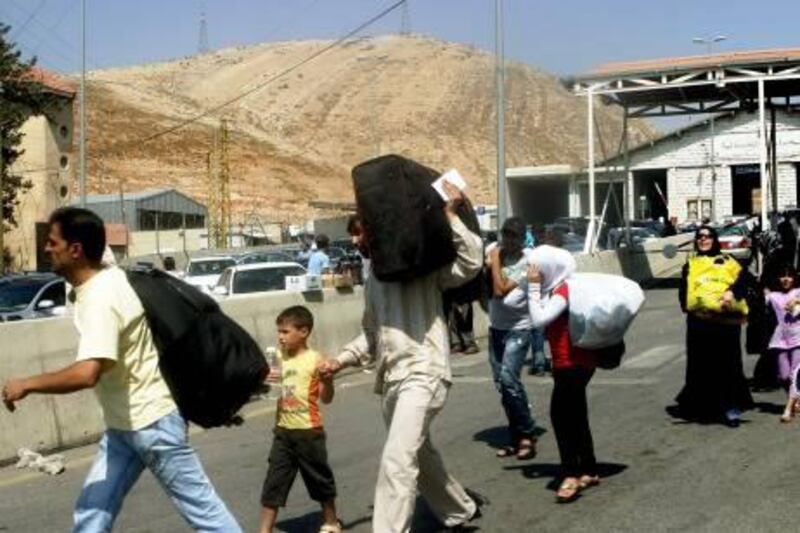BEIRUT // Fierce fighting raged between rebels and government troops in the Syrian capital yesterday, with the military issuing a 48-hour warning for residents to vacate some neighbourhoods.
As rebels and armoured units exchanged gun and artillery fire in Damascus, insurgents took control of all four major border crossings between Syria and Iraq, Iraq's deputy interior minister, Adnan Al Assadi, said. One of the first posts to fall was Abu Kamal.
"We saw the Syrian flag being brought down and the flag of the Free Syrian Army replace it," an Iraqi border police lieutenant colonel said.
Opposition groups reported clashes in the capital and elsewhere in the country, a day after Wednesday's bombing in Damascus that killed Syria's minister of defence, his deputy and another top security official.
"The army has so far exercised restraint in its operations, but after the attack, it has decided to use all the weapons in its possession to finish the terrorists off," a Syrian security source said.
"These extremely violent clashes should continue in the next 48 hours to cleanse Damascus of terrorists," a security source said.
Regime troops stormed Damascus' Qaboon district with tanks for the first time, the Syrian Observatory for Human Rights said.
Bashar Al Assad, Syria's president, attended the swearing-in of his new defence minister yesterday, Syrian state TV said, the first word of the president since Wednesday's attack.
The whereabouts of the president, his wife and their three young children have been a mystery since the attack.
Reuters quoted a western diplomat and opposition officials yesterday as saying Mr Al Assad was in Latakia.
While the Syrian government showed no sign of easing its military campaign against its opponents, the opposition Syrian National Council (SNC) said Wednesday's bombing marked "the beginning of the end of the regime".
"It was a major blow to him [Mr Al Assad] and the regime's repressive security apparatus," George Sabra, an SNC spokesman, said yesterday. The strike shows that "the Al Assad regime cannot play any role in Syria's future, and that it is a part of the past".
The assassination of members Al Assad's inner circle - which included his brother-in-law - overshadowed escalating violence in the capital and across the country on a day about 200 people, mostly civilians, were reportedly killed.
Nearly 19,000 Syrians, many from the capital, have fled from violence at home across the border into Lebanon since Wednesday, a Lebanese security source said yesterday. Major General Robert Mood, the chief United Nations observer in Syria, said yesterday his mission was irrelevant without a political process towards ending the country's civil war.
"We are not on the track for peace," he said in Damascus, as his team prepared to leave the country after a 90-day monitoring mission.
In New York, Russia and China vetoed a western-backed UN Security Council resolution that called for an extension of the observer mission's mandate and threatened tougher sanctions against the Al Assad regime.
After the vote, the US said the council has "utterly failed" on Syria and that it will now work outside of the council to confront Mr Al Assad.
The White House spokesman, Jay Carney, said Russia and China placed themselves on the "wrong side of history" and the "wrong side of the Syrian people".
The opposition Local Coordination Committees reported at least 94 people were killed in Syria yesterday, including in the outskirts of Damascus, parts of the capital, Homs and Hama. The Observatory said at least 110 people were killed, including 62 civilians. These reports could not be independently verified.
While the violence continued, rebel fighters outside the country appeared emboldened by Wednesday's bombing and reports of more defections from the Syrian army.
"I didn't smile for one year and a half except yesterday," said Abu Sham, 57, a commander with the Free Syrian Army [FSA] from Medaia in Hama province who is currently in southern Turkey to procure arms and supplies.
"Thus the killer will be killed," he said about the Damascus bombing.
Abu Mustafa, 35, a commander from Darkush, a village in Idlib province near the Turkey-Syria border, said: "This changes everything. It changes the equation and the spirit of the rebellion on the ground."
Abu Sham said he was ordering his men to go on the offensive and "will keep crawling towards Damascus and freeing area on our way".
Some analysts and observers warned against the rush to predict the imminent end of the regime.
"The situation is going to get even worse, especially as it is now past the point of [both sides] sitting down," said Timor Goksel, a former spokesman and adviser for the UN Interim Force in Lebanon.
"Such a high-profile attack further distances the chance of reconciliation. There will be more bloodshed. This has been the style of the government for it's entire lifetime - the use of force."
Both the FSA and another opposition group, Liwa Al Islam, claimed responsibility for the attack that killed Dawood Rajha, Syria's defence minister, Asef Shawkat, the deputy defence minister and Mr Al Assad's brother-in-law, and General Hassan Turkmani, the head of the regime's crisis cell on the uprising.
While questions remain about who carried out the attack and whether or not a suicide bomber was involved, there is a sense that the fact that those responsible managed to penetrate the regime's inner sanctums has ushered in a new phase of the conflict.
"It was a major intelligence blow to the regime that they could reach the upper echelons - even possibly the president," said Elias Hanna, a Lebanese analyst and retired general. "It was a turning point, but we have to wait and see."
[ zconstantine@thenational.ae ]
* With additional reporting by Agence France-Presse and the Associated Press





